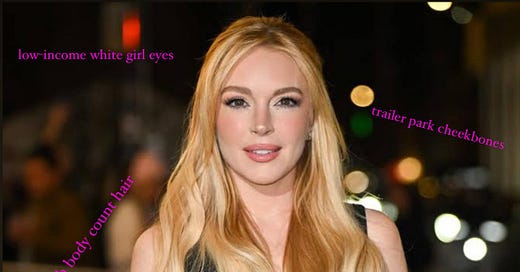how class insults are trending under the guise of beauty
from "low-income white girl eyes" to "trailer park cheekbones," class is ultra-detectable within the undetectable era of beauty
Earlier this fall, Christina Aguilera caused an online frenzy over her appearance. The icon looked like herself but subtly different, refreshed, while some began to speculate that the premiere vocalist was aging backward. Soon after, Bee Beardsworth wrote for Dazed that we are about to enter the 'Undetectable Era' of beauty. That the science of cosmetic intervention has finally reached an apex where the results achieve minute "natural" refinement. The previous stereotypical telltale signs of "having some work done" be damned.
Beardsworth writes, "... the 'Undetectable Era' is a new coding of cosmetic beauty that is perhaps not so new. In fact, this may be the Glossier, girlbossification of optimised facial transformation, and the medical world is finally catching up."
Like Aguilera, Lindsay Lohan garnered virality over her "new" facial appearance while serving looks on the press tour for her holiday romcom Our Little Secret. Lohan claims her "glow-up" occurred due to a good skincare routine and noninvasive treatments.
Regardless of the means Lohan used to attain the transformation, the concept and modus operandi of facial balancing is an anchor to undetectable beauty. But while this era of cosmetic enhancement is being ushered in, what happens to the facial and bodily qualities that are acutely detectable?
"Low-income white girl eyes," "trailer park cheekbones," and "high body count hair" are catchy insults that have been proliferating my timeline as of late. All are appearance-based insults but with a particularly class-conscious bite in divisiveness.
"Low-income white girl eyes" references those who have "tired or droopy eyes, dark under-eye circles, and a general look of exhaustion or stress." (To quote a favorite internet saying: "I have designer bags underneath my eyes.”)
"Trailer park cheekbones" refers to a "cheekbone structure associated with those from working-class, rural backgrounds,"the appearance is more angular and defined, opposite from a slim jawline.
Within the past year, the process of 'looksmaxxing' or "working out your face" for chiseled features became a mainstream wellness internet phenomenon among Gen Z boys. From the viral jawline exercise of mewing to bone smashing to chin extensions, chin filler, and mouth tape, having a jawline profile that is defined enough to slice a rock in half is now a sort of cosmetic status symbol. Now, don't get me wrong, having a prominent jawline has always been generally considered an attractive male feature, but with the internet vacuum honing in on hyper-specific body parts and qualities, our attention for precise desirable features and or undesirable features is more severe and all-encompassing than ever before. Our fixation with perfecting ourselves through metrics of aesthetic pseudoscience is at an all-time high.
The insult "high body count hair" came from The Real Housewives of Salt Lake City, where housewife Angie Katsanevas used the phrase as a slight to indicate her co-star's "cheap and pornish" looking hair—basically calling Britani Bateman a poor sex worker to her face.
All of these chronically online beauty insults unveil who can and cannot attain cosmetic treatments through disposable income. Although these insults may seem hyper-categorical and niche, the crux of them all is to essentially malign someone as white trash through an absence of undetectable cosmetic intervention.
It's inconsequential if the insults are used jokingly or if they will garner legitimacy within the cultural lexicon. Much like the inset—girl trends or the insert—core trends, these detailed appearance-based insults will quickly filter in and out of our algorithms as long as they garner engagement. Perhaps these short-hand snubs are, more than anything, a mere symptom of the widening brackets of income inequality and class divide rather than insults that are *actually* being used within the mainstream. In the undetectable era of beauty, our faces and their structures quickly transform into a silent communication of class or the aspiration of a higher class. And that in itself is another development of the micro-insecurity hell that our bodies and faces are beholden to embody, making the divisions of class even louder.





this essay just reminded me of when people were calling jeremy allen white the “working woman’s timothee chalamet” which is interesting when you consider the projects they choose.
i've never seen someone from a trailer park with a face like that though